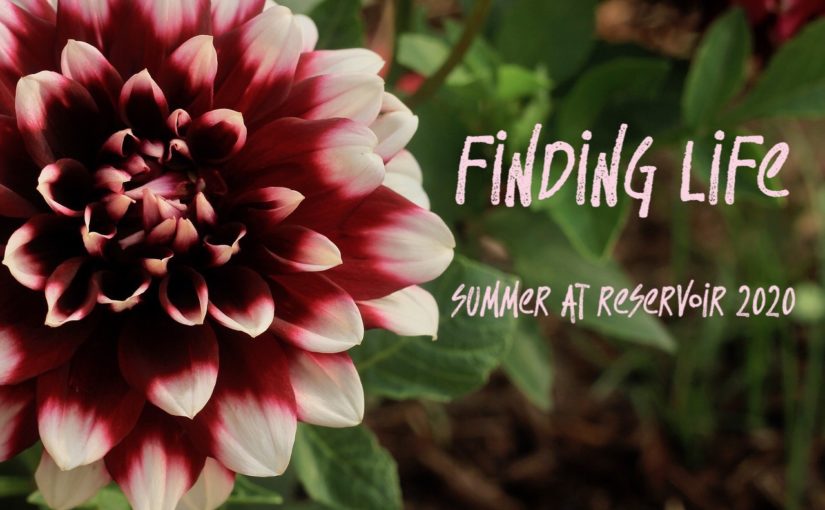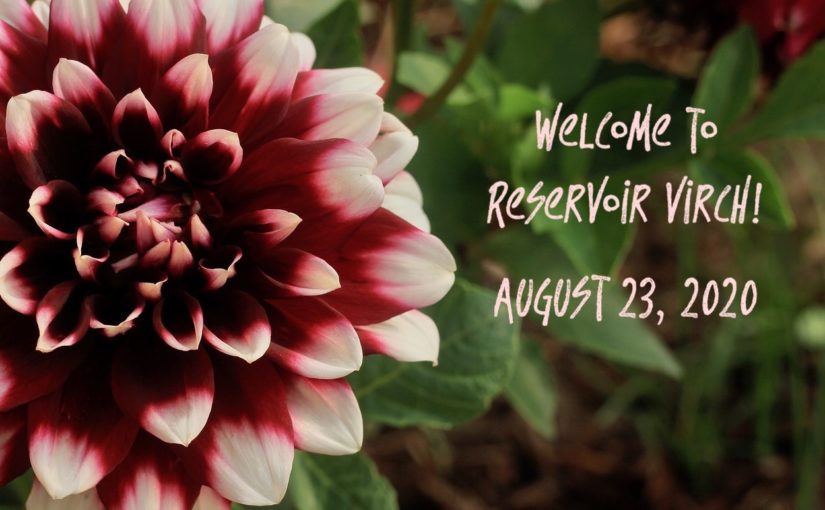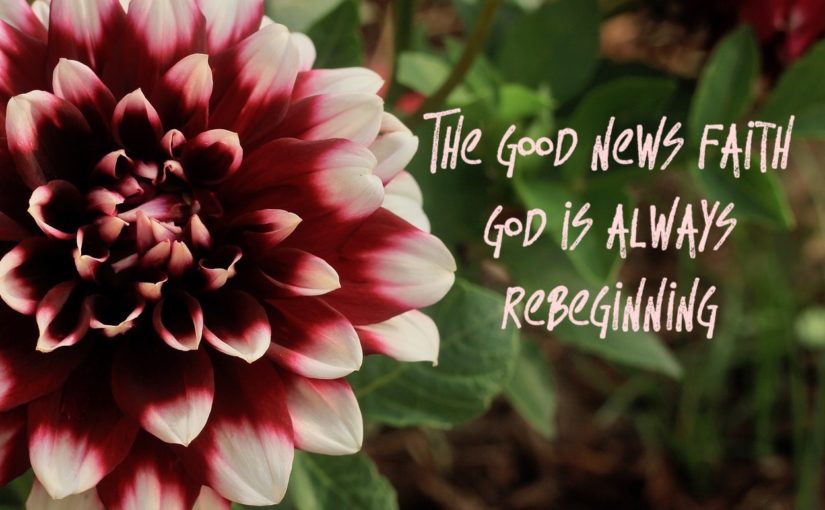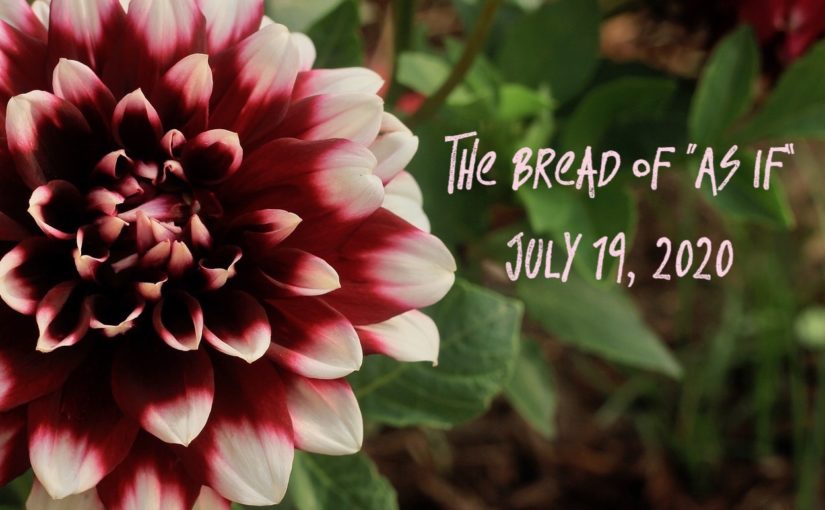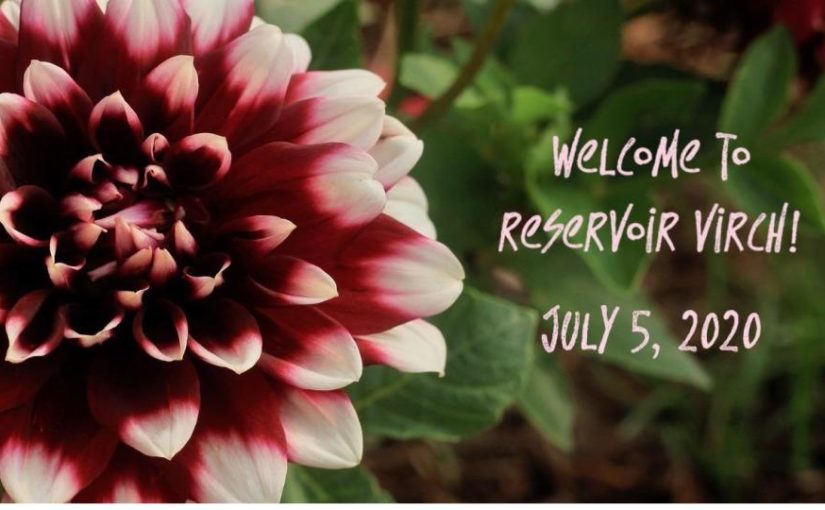For this week’s Reservoir events and happenings, click “Download PDF.”
To view this week’s service, click the YouTube link above.
Man, did I have a week last week. There was some weird and hard stuff that was particular to me, but also a lot of back to school stuff that I know a lot of you are experiencing.
Last week, my wife Grace and I spent a day driving to Philadelphia and back, so our 18-year old daughter could begin college there. This year, the mask-wearing, no partying, take some of your classes online version of college. Like many other families, for us it was all the things – a moment of pride and enthusiasm and joy, also of tears and fears and heartbreak. Eighteen years old is a big year. And this year, for all the 18 year olds and their parents, whether they’re finishing high school, or looking for jobs, or starting college or training programs – it’s a really weird and strange and hard experience this year.
Also last week, I took some days off to do some stuff with my two teenage boys. I love my kids and I’m always happy to do that, but this year, we took some time off together because they were supposed to be busy starting their first and second years of high school. Instead, though, nothing’s happening yet, because public education is figuring out how in the world to be this year. And whether it be in person school, online school, some mix of those two things school, it’s mostly delayed.
And in my house, the two teens and the two parents are getting ready for online school, part two, with a mix of sighs and dread. Last spring was not a happy, fruitful time in my household, and so this fall, we are hoping for better, but not so sure yet about those hopes.
Now I am not weighing in on the public health virtues of what school should be for kids this fall. I’m not an expert there, and I have a lot of competing thoughts on all that. I am also not weighing in on the controversy of how schools being in person or online impacts all our teachers and school staff and their families. I was a public school teacher and principal myself and I can imagine how complicated and hard this year is for everyone in our schools. The school teachers and leaders and staff I know have never worked so hard as they’re working right now, for an experience that they have no idea how good or rewarding it will be, so that’s tough.
This year is just tough for all of us. None of us get everything we want, and most of us are taxed enormously. And for all those of us who are parents, students, teachers, school staff and administrators of all kinds, this year’s back to school time is really, really hard.
So on this year’s back to school Sunday, I’m inviting us to be here for each other. The rest of September and all of October, our church theme will be the Beloved Community – the radical connectedness; the interdependent, joyful community; the community of justice and belonging that all of us who follow Jesus are called to participate in in our churches, in our households, even – as we are able – in our larger societies. We need each other, now more than ever.
On this year’s back to school Sunday, I’m also going to invite us to pray for one another, and to ask for and welcome other’s prayers for us. So our spiritual exercise this week is after the sermon, as I lead us in some extended prayer for students, for parents, for teachers, and for all school staff and leaders. If you’re with us on zoom today, we’ve left the chat open for you all this Back to School Sunday. If you’re a student or parent or teacher or school staff or leader, please post in the chat, anytime from now to the end of service, your name and which of those you are and where. For those of you on zoom OR on youtube, know that we’ll have a time of prayer for all of you in about 15 minutes, as my sermon is wrapping up.
Also, on this year’s Back to School Sunday, we’ll look to the scriptures – both the New Testament and the Old – to find wisdom and hope about how even an impossibly hard year can be a time for life and goodness and joy. Because I think all of us, whether it’s back to school for us now or not, could use pathways to life and goodness and joy right now.
Let me read for us three excerpts from the little letter to the Philippians, written by one of the earliest and most famous followers of Jesus, Paul of Tarsus.
Philippians 1:27, 2:14-15 (NRSV)
Live your life in a manner worthy of the gospel of Christ
14 Do all things without murmuring and arguing, 15 so that you may be blameless and innocent, children of God without blemish in the midst of a crooked and perverse generation, in which you shine like stars in the world.
Philippians 4:12-13 (NRSV)
12 I know what it is to have little, and I know what it is to have plenty. In any and all circumstances I have learned the secret of being well-fed and of going hungry, of having plenty and of being in need. 13 I can do all things through him who strengthens me.
Philippians 4:4-9 (NRSV)
4 Rejoice in the Lord always; again I will say, Rejoice. 5 Let your gentleness be known to everyone. The Lord is near. 6 Do not worry about anything, but in everything by prayer and supplication with thanksgiving let your requests be made known to God. 7 And the peace of God, which surpasses all understanding, will guard your hearts and your minds in Christ Jesus.
8 Finally, beloved, whatever is true, whatever is honorable, whatever is just, whatever is pure, whatever is pleasing, whatever is commendable, if there is any excellence and if there is anything worthy of praise, think about these things. 9 Keep on doing the things that you have learned and received and heard and seen in me, and the God of peace will be with you.
This is some serious positive psychology – contentment, strength, joy, upbeat mindset, honorable attention. And all this relentless positivity, depending on your temperament might be really inspiring or downright annoying.
But before you write off this letter as phony or ungrounded or out of touch with troubling times like ours, it’s worth pointing out that Paul wrote it from prison. He was being held for his subversive faith, and though he would gain his freedom eventually, he would later be arrested again and executed in Rome.
And the little house churches in the city of Philippi that Paul is writing to lived on the margins of their city – there were slaves among them, and all of them practiced a faith that was misunderstood and maligned by most people.
The author of this letter, and the people he’s writing to, know about pain and poverty and discrimination and difficulty. In fact, not to minimize our troubles in 21st century America, but I’d argue that Paul and the great majority of people in the Philippian house churches knew hardships beyond what most of us can fathom.
Life expectancy in the Roman empire was around 25 years old. 25. And even if you made it alive to adulthood, odds were still that you would die no later than your 50s. Slavery was widespread, as I’ve mentioned, cities were dirty, sanitation was horrible, taxes were brutal.
I belabor this a little to say that everything Philippians has to say about strength, resilience, contentment, joy, and peace is said in the context of really hard times.
Paul’s insistent, though, that for him and for all followers of Jesus, when we know that God is really with us in all things, we have reasons to rejoice. We can access joy and peace that go beyond what we or anyone else would expect.
Where the Spirit of the Lord is, there can be strength. Where the spirit of God is, there can be joy. Where the spirit of the Lord is, there can be peace. Where the Spirit of God is, there is ever-increasing freedom.
I’ve called this talk Shining Like Stars, after the passage from Philippians I read, the one that also talks about living lives “worthy of the gospel.” Here’s what that doesn’t and does mean, though. This doesn’t mean being super-good people, faking moral perfection for God and smiling at the rest of the world while we grit our teeth over all our troubles.
God-with-us doesn’t need us to be perfect. The good news of Jesus doesn’t invite us to perform fake happiness, fake peace, or fake anything.
No, the shining like stars Paul talks about is when as our authentic selves, we are lit up, shined upon, energized by a force beyond ourselves. Shining like stars is finding a way of life that leads to joy and peace in all times. And a life worthy of the gospel isn’t earning or measuring up to God’s high standards for us, it’s a life that is touched by gospel, which means good news. It’s a life full of good news.
So my question not just this day, but this year really, is how do we live with good news when so much bad news keeps coming our way? How do we access this peace and joy, when life isn’t how we want it to be?
This is why I’ve been reading Philippians, to learn from God how to live a good life in bad times.
I thought of all this when last weekend, I saw an unusual tree.
Imagine you’re a little sapling, starting to grow up into a birch tree nearby a riverbank. You might look like this.
TREE PICTURE #1 – close up of the bottom
We saw this tree on a family hike we took in New Hampshire a little over a week ago. We were giving our daughter a goodbye hike in the White Mountains before she left home and we walked by this tree.
What stuck out were the conditions under which this tree had to live. Because that tree had the misfortune of growing right where the dirt met this enormous boulder of a rock. So that its root system ended up looking like this.
TREE PICTURE #2 – roots all over the rock
That’s not a good thing, by the way, for a tree. Those tiny patches of dirt on top of the rock where so many roots are going are not giving the tree all that much water or nutrients. That rock is like our year of coronavirus. It’s forced limitations. It’s the stress of people stuck at home together, or stuck at home alone. It’s the stress of doing public life behind masks, or going to work and not knowing if it’s safe, or wondering who will get sick, or when your kids will ever go to school again, or what all this time in front of the computer is doing to them. That rock next to the tree is the toxin of racial injustice for people of color in America – all the extra burdens of representation and stress and fear and grief.
This year, we do not find ourselves living in ideal conditions for human flourishing – far from it. Just like a tree that’s planted in seriously rocky soil.
But I want you to see what’s become of this tree.
TREE PICTURE #3 – birch tree canopy
It’s so beautiful now. It’s a little crooked, to be sure, but it’s grown up tall and strong, and is part of a beautiful green canopy above the riverside. Because again and again, it’s drawn from those roots alongside the rock, it’s drawn not from the one side stuck over that boulder but from the dirt side of its life, right along the moist, fertile riverbed. And it’s grown well.
The Bible invites us again and again to see our lives like trees like this. Here’s just one spot, from the prophet Jeremiah.
Jeremiah 17:7-8 (NRSV)
Blessed are those who trust in the Lord,
whose trust is the Lord.
8 They shall be like a tree planted by water,
sending out its roots by the stream.
It shall not fear when heat comes,
and its leaves shall stay green;
in the year of drought it is not anxious,
and it does not cease to bear fruit.
Human flourishing is to be a tree with deep roots, by healthy, flowing water. And God is meant to be to us not a set of ideas or beliefs, but a spring of life, that cool glass of water you drink after an afternoon under a hot sun.
Human flourishing, the blessing of faith, is to not succumb to fear or anxiety in hard times, but to stay green and bear fruit, not because we are powerful or special or disciplined, but because God is with us.
The reason that Paul says – Keep on doing the things that you have learned and received and heard and seen in me – is that he’s been teaching us how to connect with the God of life, how to get all this nourishment. He’s teaching a way of life that is all about drawing water and nutrients from the soil you’ve got, even when you’re up against a rock. It’s all about trust in God that helps us flourish, about accessing contentment, joy, and peace, when life’s not seeming to give us a lot of reason to have all that.
Paul often calls this life, this shining like stars life, life in the Spirit. And Philippians gives us really practical pictures of what this life entails. I’ll close mentioning quickly just five of these.
- We’re invited to trust the God who has suffered before and suffers all things with us still. This is at the heart of the good news, that there is no pain or challenge that can come our way that God won’t be with us in.
- We’re encouraged to stay out of needless arguments. I grew up in a family with a lot of pointless arguments, and I’ve started and jumped into my share of them too in my life. And yet they give me nothing but stress and headaches. And Paul’s like – don’t! Stay out of the murmuring and arguing circuit. Don’t make a habit out of needless criticism. Now obviously we have to discern the difference between just causes worth fighting for, arguments that have a lot of point to them and need to be made, and those disputes and disagreements that will go nowhere. For instance, all the public argument over the best and safest ways to do school this year. It’s not like it doesn’t matter – the stakes are high for our kids and our teachers and our parents. We’ve got to figure this out. But the levels of blaming and criticizing and armchair experting are out of control in a lot of communities. We’re stressed out – all of us – but there are a lot better things we can do with our stress than channelling it into bitter conflicts. Here are three better options.
- We can take up Paul’s dare to us to rejoice because God is near. We may be up against a boulder, but there is rich soil on our other side. Life may be hard, but God is with us, and we have resources. We can look for real, authentic reasons to praise God at all times, not in denial of our circumstances, but because our circumstances don’t get to define us. We’ll practice this in a minute.
- We can also practice gratitude. Philippians tells us that in addition to praying about our troubles, giving thanks on the regular is part of how we access that unexpected peace. Science confirms this powerful benefit of regular mindfulness of and expression of gratitude.
- And lastly, we can share our anxieties with Jesus, we can express them in prayer and ask for the help we need. We see this attitude in the serenity prayer that’s so common for folks in recovery. “God, grant me the serenity to accept the things I cannot change, the courage to change the things I can, and wisdom to know the difference.” Because surrender and acceptance of the hard things in our life is a really powerful practice of being able to stop numbing out in addiction to try to avoid them. The original version of this prayer, from the theologian Reinhold Nieburh, Barack Obama’s favorite philosopher, for what it’s worth. Imagine having a president who had a favorite philosopher, a favorite theologian. It happened once. Anyway, the original prayer was: Father, give us courage to change what must be altered, serenity to accept what cannot be helped, and insight to know the one from the other.
Life in hard times calls for courage. This school year, we’ve got a lot to do. If we’re teachers or otherwise support schools, we’re called to be adaptive, we’re asked to be brave, and we’re called to work our hardest to serve kids in what’s been a really bad year to be a kid around here. And if we’re parents, we’re called to the courage of faith, that this year isn’t the end for our kids, that it won’t ruin them, that good things are still possible in their lives right now. We’re called to a redemptive angle, to look for the good that is possible now, rather than just the goods we can’t have. And we’ve got lots extra to do right now as well. And if we’re students, we’ve got a lot to do to make the most out of not so great conditions for living, let alone learning. All of us have a lot to do this year.
But we also need the wisdom to see everything that we can’t do anything about, and find acceptance and peace.
In the hardest seasons of my life – times of crisis, times of unemployment, times of conflict and relational breakdown, times of unending stresses at work, times when I felt like I carried so many burdens on my shoulders and no one understood – in these times, to say to Jesus: here are my anxieties. I’m concerned about this, and I’m burdened about this, and I don’t know what to do about this, and I need you Jesus, to help me and to hold all this stress and weight so that it doesn’t bury me.
And, I don’t know, 8 times out of 10, something happens there. I feel accompanied, carried. I remember I’m not alone. Perspective or wisdom comes. I remember who I can ask for help, and what’s not riding on my shoulders. I gain courage or hope. I can dance and sing again, not just shuffle and murmur.
This is what it means to shine like stars, for the God who is with us to lighten us and light us up again. And this is the life worthy of the gospel – not a morally pure or perfect one, but a life suffused with good news, a life that even in hard times receives, holds, lives, carries, brings good news.
Friends, let’s look to live that life this year.
In just a moment, we’re going to pray for everyone who’s going back to school this fall in any way. But before that, we’ll also have a chance for all of us who want to bring our whole selves to God like this for a moment.


